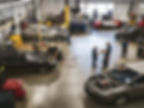Clutch Replacement Service

🕹️ Clutch Replacement — Service, Symptoms & What to Expect?

A worn or failing clutch is more than just an inconvenience—it can impact your vehicle’s performance, fuel economy, and gear shifting. If you're noticing power loss, difficulty changing gears, or grinding noises, it may be time for a clutch replacement. Our certified mechanics offer expert clutch replacement service for all makes and models. Here’s what you can expect:
✔ Transmission Removal & Inspection – We remove the transmission to inspect all clutch-related components.
✔ Clutch System Check – We examine the clutch disc, pressure plate, and release bearing for wear or damage.
✔ Flywheel Inspection – Checked for warping or cracking; resurfaced or replaced as needed.
✔ Clutch Installation – We install new, high-quality parts to restore smooth, reliable gear changes.
If left unaddressed, clutch problems can lead to transmission repair damage or leave you stranded. Book a our clutch inspection and keep your vehicle shifting the way it should.
Common Symptoms for Clutch Replacement
Difficulty Shifting Gears: Hard or jerky shifts between gears may indicate a worn-out clutch.
Spongy or Stiff Clutch Pedal: If your clutch feels soft or difficult to press, it may need replacing.
Loss of Acceleration or Jerking: If your engine revs but the car struggles to accelerate, the clutch could be slipping.
Grinding Noise During Gear Changes: A grinding sound when shifting is a common sign of clutch failure.
Burning Smell: A smell similar to overheated brakes often indicates that the clutch is burning out.
RPMs Increasing but Speed Not: If your engine revs up without corresponding speed, it's a sign that the clutch isn’t fully engaging.
How a Clutch Works & Why It Wears Out
The clutch connects your engine to the transmission and enables smooth gear transitions when you shift. Over time, the clutch disc, pressure plate, and release bearing wear down due to friction and heat, leading to a loss of performance and drivability. Common causes of clutch wear include:
Stop-and-Go Traffic: Frequent gear changes in city driving can accelerate clutch wear.
Aggressive Driving: Hard acceleration and rapid gear changes put extra strain on the clutch system.
Riding the Clutch: Keeping your foot on the clutch pedal while driving can cause unnecessary wear.
High-Mileage Vehicles: Vehicles with 85,000+ kilometers are more likely to need clutch replacement due to natural wear.
Towing Heavy Loads: Carrying heavy loads or towing can significantly shorten the life of your clutch.
Book Your Clutch Replacement Service Today

If you’re noticing any of the symptoms of clutch failure, don’t wait—book your clutch replacement with us today! Get a free quote or schedule your service online or by calling us. Let us restore your vehicle’s smooth driving experience.
Why Local Drivers Choose Our Clutch Replacement Service:
Experienced Technicians: Skilled in clutch repair for all makes and models.
Transparent Pricing: clear estimates before work starts.
Fast Service: Quick turnaround without sacrificing quality.
Guaranteed Satisfaction: Warranties on both parts and labor.
Easy Scheduling: Book online or call at your convenience.
📍 Clutch Replacement Experts Near You

Serving drivers across the GTA and beyond—including Barrie, Burlington, and Hamilton—our clutch replacement specialists provide fast, efficient service every time. We replace worn clutch components to restore smooth shifting and proper engagement, enhancing your vehicle’s drivability and extending transmission life.

⚑ Close to Steeles Ave & Torbram Rd Brampton, ON L6T 1A7
✰✰✰✰✰4.8 star rating

⚑ Just off Appleby Line & Corporate Dr Burlington, ON L7L 5T9
✰✰✰✰✰4.9 star rating

⚑ Nearby Burnhamthorpe Rd & Kipling Ave Etobicoke, ON M8Z 2X3
✰✰✰✰✰4.8 star rating

⚑ Near Mohawk Rd & Upper Sherman Ave Hamilton, ON L8V 4G7
✰✰✰✰✰4.6 star rating

⚑ Near Matheson Blvd & Hurontario St Mississauga, ON L4Z 2Y5
✰✰✰✰✰4.4 star rating

⚑ Close to Finch Ave & Weston Rd North York, ON M9M 2Y3
✰✰✰✰✰4.5 star rating

⚑ Right by Howard Park Ave & Bloor St Toronto, ON M6R 1V5
✰✰✰✰✰4.7 star rating
💬 Clutch Service: FAQs

Looking for clutch replacement info? These FAQs explain what to expect during clutch service and repair.
How do I know if my clutch is going bad?

Signs include difficulty shifting gears, a slipping clutch, strange noises when pressing the pedal, or a soft or stiff clutch pedal.
How long does a clutch replacement take?

Clutch replacement usually takes between 4 to 6 hours, depending on the vehicle type and the complexity of the repair.
How much does a clutch replacement cost?

Clutch replacement costs vary but generally range from $500 to $2,500, depending on the make and model of the vehicle.
Is it safe to drive with a slipping clutch?

It's not recommended to drive with a bad clutch, as it can lead to complete failure, preventing you from shifting gears safely.
What is a flywheel & is it replaced with the clutch?

A flywheel is a heavy metal disc attached to the engine’s crankshaft in manual vehicles. It works with the clutch to transfer power from the engine to the transmission and helps keep engine speed steady. While the flywheel isn’t always replaced during clutch service, it’s inspected for damage or wear. If it’s warped, cracked, or has excessive heat spots, your mechanic may recommend resurfacing or replacing it to ensure your new clutch performs smoothly and lasts longer.
How long do clutches typically last?

A clutch can last anywhere from 85,000 km to 160,000 km, depending on driving habits and conditions. However, aggressive driving or frequent stop-and-go traffic can wear it out more quickly.


